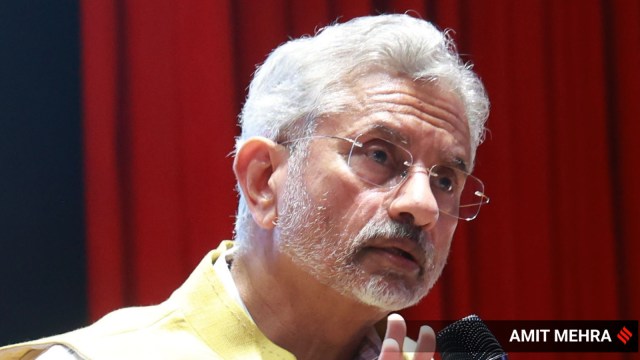Stay updated with the latest - Click here to follow us on Instagram
Border areas neglected prior to 2014; if someone practising cross-border terrorism, you must respond, says Jaishankar
Jaishankar, during his address, posed a rhetorical question – “If support is given abroad to separatism or worse, should we display equanimity?”
 Even when logistics has been a key to security and warfare, it remained a neglected dimension till recently, Jaishankar said. (Express file photo by Amit Mehra)
Even when logistics has been a key to security and warfare, it remained a neglected dimension till recently, Jaishankar said. (Express file photo by Amit Mehra)Noting that terrorism has plagued India from the moment it became independent, Union Minister of External Affairs, S Jaishankar, on Saturday lamented that “neglect” of border areas prior to 2014 has cost India “dearly”.
Jaishankar was addressing the third convocation of Rashtriya Raksha University (RRU) in Gandhinagar where 414 students were conferred with degrees.
Exemplifying the neglect of Indo-China border areas, Jaishankar said, “Take our border areas facing China as an illustration and let the figures speak for themselves. Today, road construction is 2 times, bridging and tunnelling is 3 times and the border infrastructure budget is 4 times compared to what was the commitment and achievement of the last decade. It is not just the length and number of roads, tunnels and bridges but the consequences they have for our operational capabilities.”
“In the last decade, we have seen all-weather connectivity to Ladakh and Tawang, focus on access to critical passes along LAC and the construction of world’s highest motorable world over the Umiling La Pass (in Ladakh). Consider the implications when the crossing of the crucial Zoji La access (in Kargil, Ladakh) is halved today to just 73 days…,” he added.
“My purpose of highlighting the change with regard to infrastructure is four-fold. One, to emphasise how dearly complacency and neglect can cost us in the domain of security. We saw that graphically in 1962 but sadly, its lessons were not apparently learnt by those who came later. It is only now that we are approaching border infrastructure with the seriousness it desires. Second, is the imperative of a larger assessment that guides security-related policies and activities. Misjudging the posture of neighbours and believing that neglect of border areas is in itself a defence, has been costly. It too has required strenuous efforts since 2014 to be corrected,” he further said.
“Third, the application of new technologies and modern construction techniques has yielded visible results. This has also been accompanied by a reform of organisations like BPRO. Fourth, all of the government’s approach towards pressing national challenges has been overcoming the silos of the past…”
Jaishankar also said that in a digital age, security faces challenges of a different nature. “In a digital age, where narratives can be powerful and disinformation better masked, security faces challenges of a very different nature. Radicalisation, even from a distance, can be extraordinarily disruptive. At the same time, there are persistent efforts to delegitimise the elected, distort debates and define political correctness. Much of this arises from the interests of a few that pass off as the views of many.”
Jaishankar, during his address, posed a rhetorical question – “If support is given abroad to separatism or worse, should we display equanimity?”
He emphasised that part of counter-terrorism efforts also include striving to contribute to the security of other nations. “As the world has seen, (terrorism) is a domain that draws energy from technology and technological advancements. Counter terrorism thus challenges our capabilities and imagination. As our interests expand, we have to strive to also contribute to the security of others. This may be in the immediate neighbourhood or it may be in terms of financial, health and energy support to them, or indeed to a larger constituency like Global South, to whom we provided vaccines during Covid-19 (pandemic), and development and security support even otherwise.”
At a subsequent Q & A session with students, Jaishankar said, “India has been subjected to it (terrorism) with an intensity and a time period, which absolutely no one else has been in the last 80 years… Don’t think terrorism began now or started with Kashmir valley, terrorism started from the moment of our Independence (in 1947) when so-called raiders came from across Pakistan…”
“…the 26/11 attacks in Mumbai was the tipping point, where we saw the true graphic impactful face of terrorism. We need to counter it, first. I don’t think turning the other cheek is the mood of the nation, I don’t think it makes strategic sense. If someone is practising cross-border terrorism, you must respond, you must extract or impose a cost… and you can see the change in the past decade.”
“Second is to delegitimise it… Other countries made it look like terrorism is part of post Partition effect… Unless we hammer home the terrorism message, that terrorism should be outside what is allowed in legitimate competition… the (Union) home minister for example, has taken great interest in furthering this ‘no money for terror’ initiative because at the end of the day, what sustains terrorism? It is money… Countries that practised it (terrorism) are discovering that terrorism comes back to bite… they have grown and nurtured these forces and those very forces are turning on (them),” he added.







